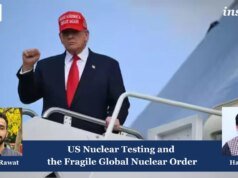ANIL TRIGUNAYAT
In recent months, Israeli intelligence outfits and their firepower with precision strikes appear to have redeemed themselves since the October 7 terror attacks by Hamas, whose unprecedented success not only derailed the pace of rapprochement between Arab states and the Jewish state but also raised questions about the much-acclaimed, even if spurious and clandestine yet highly successful operations.
Israel’s Prime Minister Benjamin Netanyahu, with his hawkish political bedfellow, could never have tolerated it, as it would have been a last nail in his political coffin. Hence, he took the risk of alienating even his closest allies, making it an issue of the very existence of Israel, and went all out in Gaza, flattening it out unmindful of thousands of civilian casualties and leaving humanitarian disaster questions unheeded.
Netanyahu did not care much for the domestic discontent and international concerns, including the International Court of Justice, International Criminal Court rulings and warrants, or for that matter, UN General Assembly and UN Security Council resolutions, as one of its ambassadors even wanted it to be bombed, and the other one called the ongoing UNGA a circus. He unflinchingly went on in Gaza, decimating and destroying Hamas capabilities to the extent that they no longer remained a major threat while finding excuses with any ceasefire deals.
Reports indicated that after the killing of Ismail Haniyeh, the Hamas leader, in Tehran (which openly Israel did not own up so as not to give Tehran a pretext of violation of its sovereignty and hence direct retaliation), new leader Yahya Sinwar and family were offered an exit as the precision and random bombings continued. Sinwar appears to have been incommunicado.
In the near term, Bibi may have redeemed himself, and being a political fighter, he may face the Commission of Enquiry with some credibility while the Palestinian lives did not matter. The fact that the international community became a mute spectator to this mayhem with anodyne statements is a testament to the pervasive unilateralism not only among the superpowers but the middle and smaller powers can also get away with it. Only fall out of the mayhem is that Palestinian issue is back on the burner even though resolution may be way off.
For over a year, Hezbollah was continuing to maintain pressure on the Northern Front of Israel, forcing around 70,000 Israelis to leave their homes, which became a priority once Netanyahu sailed through Gaza. He adopted the ‘decapitation strategy’ to deal with Hezbollah. In the meantime, skirmishes remained below a certain threshold. But Israeli intelligence agencies were working overtime to identify and locate and, with exemplary precision, kill the military leadership of Hezbollah to debilitate their capacity and coordination matrix.
As the international pressure kept on mounting, especially at the UNGA delegates after delegates accused Israel of provoking a regional escalation and war as Iran tried to play a good boy by maintaining strategic patience as far as its direct intervention was concerned, Netanyahu signed off in New York itself, in consultation with his American benefactors, the death warrant for the Hezbollah leaders, including its head, Hassan Nasrallah, which is the biggest blow to them and some relief to the Lebanese government as well as other Arab states that had no love lost either with Hamas or Hezbollah.
They might feel a sense of elation as the proxy power of Iran may have been impacted, as in the wake of Hezbollah assassinations, the Iranian leader Ayatollah Khamanei was taken to a secured location. He eulogised the slain leader Nasrallah, stating, “The wicked entity of the Zionist regime has not achieved victory in this incident, for Sayyed of Resistance was not merely an individual; he was a path and a school of thought, and this path will continue.”
The Iranian Foreign Ministry followed up with a warning: “The consequences of Seyed Hassan Nasrallah’s assassination are directed at Israel and America. Israel’s actions will never go unpunished. Iran will use all its capacities to support the people of Palestine and Lebanon.”
Although, overtly, Netanyahu warned that his tirade was against the non-state actor and terrorist organisation Hezbollah and not against Lebanon, the collateral casualties and violation of sovereignty of a helpless state are a big question mark for the so-called rules-based order, which is trying to stand on its crippled legs.
The fact that the command and control matrix of political and military leadership of the most powerful of the 4Hs—Hamas (Gaza), Hezbollah (Lebanon & Syria) , Houthis (Yemen), and Kataib Hezbollah (Iraq)—has been decimated, and the ease with which they have been eliminated clearly points to their strategic weakness internally and attests to the exceptional capability of Mossad and others to infiltrate.
Technology has been a game changer as the chaos and fear that was engineered when a few weeks ago hundreds of Lebanese were killed and thousands injured in the blasting of pagers and handsets. This also provoked fear across the world and was condemned widely since using communication devices and networks as IEDs has unprecedented security ramifications.
As President Joe Biden bids farewell at the UNGA and Future Summit, he has asked Netanyahu to accept the ceasefire deal so that the plight of Gazans could be relieved and around the remaining hundred Israeli hostages are released. Of course, day-after scenarios in Gaza and Lebanon will be of equal importance. Hopefully, Netanyahu will not indulge in ground invasion and further adventurism in Southern Lebanon, which will be far more disastrous and dangerous even for the Jewish state, although the IDF Chief of Staff, General Herzi Halevi, claims that “this is not the end of our (Israel’s) toolbox”.
Peace is the only security at the end of the day.
Anil Trigunayat, is a former Indian Ambassador to Jordan, Libya and Malta, and currently heads the West Asia Experts Group at Vivekananda International Foundation.
This article was first published in Firstpost as “How Hezbollah chief’s killing may affect the Gaza ceasefire deal” on 29 September 2024.
Disclaimer: All views expressed in the article belong solely to the author and not necessarily to the organisation.
Read More:
India-GCC Dialogue: A New Chapter in Strategic Partnership and Regional Connectivity
Navigating New Alliance: Why India Should Prioritize an Invitation to Dissanayake
Acknowledgement: This article was posted by Meenu Mohan, a research intern at IMPRI.



















